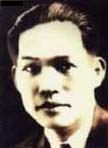Sống sao không thẹn với đời
Chết sao để tránh ngàn lời mĩa mai
Sống vỉ thế hệ tương lai
Chết vì đất nước tù đày không than
A great homage to Nguyễn An Ninh
through my Six-Eight verses:
To live in such a way one has no shame of living
To die in such a way to avoid thousands of ironies
Is to live for future generations
And to die for one’s country without complaining days in imprisonment.
dead at Poulo Condor
Facing Nguyễn An Ninh’s flat refusal to repent and the alarming situation caused by the imminent landing of the Japanese army in Indochina in 1943, his jailer, the warden of the Poulo Condor prison, Mr. Tisseyre decided to eliminate this burdensome prisoner who was sick and potentially dangerous in his view because the Japanese could later use him as a pawn on the Indochina chessboard.
Nguyễn An Ninh since his coming back to Vietnam, became not only, as time went by, an idol for the Vietnamese youth but also one of the most respected leaders among Vietnamese intellectuals in Cochinchina. Even during his imprisonment in Poulo Condor, he was the only one to have received the esteem of all political prisoners no matter they are communists, nationalists, Trotskists or other etc… and to have brought peace in case of stormy debates or virulent altercations between prisoners.
How come a young man like Nguyễn An Ninh arrived at becoming a « bête noire » of the colonial authorities? However at the beginning he did not have intention to resort to violence like the Nguyễn Thái Học nationalists or the Vietnamese communists. He supported himself with his pen and the newspaper « La cloche fêlée » whose director was a longtime friend of his, a French of the name Eugene de Jean de la Bâtie. He made a mistake to have dared demand with fanfare for his compatriots the freedom of expression and fundamental rights which he had fully enjoyed during his years of study at the Sorbonne in Paris, and which were lacking then in Vietnam, by using his caustic and careless critics, and succinct analyses in his newspaper. He did not even conceal his sympathy that his has always had for the leader Phan Chu Trinh, a friend of his father Nguyễn An Khương. He was the translator of Jean Jacques Rousseau’s « Social Contract ». By means of seminars and public debates, he succeeded in provoking a collective awareness among Vietnamese intellectuals of the 1920’s and 1940’s who up until then were asleep in a seemingly happiness, freedom and justice created by the colonial authorities. Those young intellectuals only bothered with universally human subjects such as love, family, sadness of separation etc… Although they are often alongside with the rural area, they never asked any questions about what was going on there. Not that they ignore the poverty outside urban areas but they never lived there. Even though they were not issue of large estate bourgeoisie or sons of collaborators, they nourished the dream of becoming government officials.
From his return to Vietnam in 1922, instead of going into this traditional mould like others of his age, his generation, Nguyen An Ninh, this young man of 22 years of age, with rounded hairdo, law graduate from the Sorbonne, made his way in the opposite direction by advocating the method of the Indian poet Tagore. The latter thought it would be possible to obtain independence without bloodshed from the British by means of straightening up to the intellectual level of the Indian people. That was why with the help of some of his friends he did not hesitate to launch a series of debates on themes such as » A culture for the Annamites », « The ideal of the Annamite youth » etc…, which provoked from then on visible swirls in a harbor of peace established by the Governor of Cochinchina, Mr. Cognacq.
He was the instigators of several petitions claiming not only freedom of expression but also freedom of education and freedom of the press for the natives. It was a significant worry for this governor because through his tonic speeches, Nguyễn An Ninh arrived at mobilizing and electrifying the intellectual youth of South Vietnam, casting doubts among the Vietnamese intellectuals having at the time total confidence in the French education system in Indochina. Cognacq was compelled to react because each speech animated by Nguyễn An Ninh provided the occasion to mobilize more and more people. Cognacq did not hesitate to remind him several times that there was always room at the prison of Poulo Condor for recalcitrant people like him. On the other hand, he would have access to an important post in the colonial administration if he gave up this suicidal adventure. Despite this reminder full of threat, Nguyen An Ninh continued persevering in this political involvement, which compelled the colonial authorities to imprison him several times. His first incarceration was shortened thanks to the strong intervention of many French personalities of that time, especially that of Romain Rolland, Nobel Price winner in literature in 1915, before the colonial authorities. From then on, Nguyễn An Ninh became not only a regular visitor of the prison but a man to bring down for the colonial authorities. Having been aware of the impossibility of claiming before the colonial authorities the fundamental rights by peaceful means, he soon undertook secretly the armed struggle. He became thus the leader of the party « Hope of the Youth ( Ðảng Thanh Niên Cao Vọng ) being successful in having more than 7000 adherents during its existence and aiming at redistributing land to poor peasants in 1927.
His renown allowed him to make friend with the leaders of other political movements, especially with trotskist Tạ Thu Thâu, journalist Hồ Hữu Tường, young attorney Trịnh Ðình Thảo, communist Nguyễn Thị Minh Khai etc…
He was contacted several times by the communists and the Nguyen Thai Hoc nationalists and asked to join their movements but he took the pretext of being closely watched by the colonial authorities to refuse their proposals with courtesy. Closer to the communists in his ideas and struggle, he knew however how to make a difference. He never concealed that he had in himself the ideas of Jean Jacques Rousseau and Diderot. He loved to be above the melees and political rivalries and considered himself above all a Vietnamese intellectual serving his country.
Taking advantage of the political confusion taking place in France by the dissolution of the French communist party by president Edouard Daladier ( 25 September 1939 ) and of the lack of support from the French intellectuals that Nguyễn An Ninh had up until then, it did not take the colonial authorities long to put their hand on Nguyễn An Ninh and expeditiously sent him to the Poulo Condor prison by charging him with being the troublemaker and instigator of peasant revolts.
Very few Vietnamese dared talk about this prison without emotion. It is all about an archipelago of 14 small islands located at 180km from Vũng Tàu (ex Cap Saint Jacques) and accessible after 12 hours by boat. By the end of 13th century, Marco Polo noted that island Côn Sơn, the greatest of all 14 islands was uninhabited. The Poulo Condor archipelago was the object of secular dispute between the Vietnamese, Khmers and Malays. It was discovered one beautiful morning, 28 November 1861, by the lieutenant of the French Royal Navy of Napoleon III, Lespes Sebastien Nicolas Joachim. It became thus a French possession during colonial time and stood out among famous prisons.
But Nguyễn An Ninh remained the only one capable of wiping out all stormy discussions between protagonists. To relax in jail, Ninh composed many poems but the most famous remains the following found in his pocket at his interment by his prison inmates:
Sống và chết
Sống mà vô dụng sống làm chi
Sống chẳng lương tâm, sống ích gì
Sống trái đạo người, người thêm tủi
Sống quên ơn nước , nước càng khi
Sống tai như điếc, lòng đâm thẹn
Sống mắt dường đui dạ thấy kỳ
Sống sao nên phải cho nên sống
Sống để muôn đời, sử tạc ghi…
….. ….
Chết được dựng hình tên chẳng mục
Chết đưa vào sử chữ không phai.
Chết đó, rõ ràng danh sống mãi
Chết đây, chỉ chết cái hình hài
Chết vì Tổ Quốc, đời khen ngợi
Chết cho hậu thế, đẹp tương lai
Living and Dying
Living useless is not worth living
Living without a conscience is living useless
Living counter to humanism is pitiable
Living forgetting one’s country is despicable.
Living as if deaf is shameful
Living as if blind is embarrassing
Living the way one should would one live
Living as such that history engraves memory
Dying statue erected in one’s name undecayed
Dying legacy entering history unfaded
Dying that way is like living for ever
Dying as such is only physical dying
Dying for one’s country is praised at all time
Dying for posterity is a beautiful dying
His death could have gone unnoticed had there not been the check of prison guard Rognon who by coincidence verified the bag containing the bodies of prisoners dead the day before ( 14 August 1943 ) and scheduled to be sent to the morgue. Taken by pity and admiration he always had for Nguyễn An Ninh, he decided to alert Mr. Tisseyre, the director of the prison and asked him for permission to bury Nguyễn An Ninh in a coffin. But he did not know that Nguyễn An Ninh was liquidated on order of Tisseyre with a shot of arsenic. That was why Tisseyre, embarrassed by that suggestion, did not hesitate to remind Rognon that he was beginning to be interested in businesses that have nothing to do with him. Alerted by the death of her friend Nguyen An Ninh she had known at the time when she was a young student at the Sorbonne, the wife of the director of the electric company at Poulo Condor, Mme Charlotte Printanière insisted at length with Tisseyre that Nguyễn An Ninh be buried with dignity. Facing Tisseyre’s inhuman treatment, she was compelled to to tell him with irritation:
A person like him deserves being respected when it comes to a Vietnamese patriot. You would lose nothing if you bury him the way it should be. Besides, you will be appreciated for your your generosity. For what reasons do you continue to stop showing your admiration toward this true revolutionary? Who dare say in the future you will always be the winner? »
In spite of this remark, Tisseyre remained impassible. He left the body of Nguyen An Ninh in a pitiful condition with his clothes in tatters. He was buried the next day at Hàng Keo by his prison inmates. As for Mme Charlotte Printaniere, she was recalled to Saigon a few days later and was forbidden to return to the island. Her remark became a prophecy a few years later. Tisseyre was imprisoned in his turn by the Japanese army and was sentenced to 20 years in prison by General De Gaulle ‘s court martial for having surrendered without conditions to the Japanese Army.
By means of Tisseyre, the colonial authorities succeeded in killing Nguyễn An Ninh. But they forgot the phrase that Nguyễn An Ninh had recalled well in his poem « Living and Dying« . Dying here is just the physical death of the body. Actually, Ninh has gone but there are many other Ninhs who came to take his place and the torch of the struggle. Since the beginning of time, history has taught us that it is always possible to eliminate all the instigators of revolts but it is impossible to eradicate their ideas, especially those having to do with the defense of a just and legitimate cause.
Nguyễn An Ninh is not only the person having a notable influence on the intellectuals of South Vietnam in the 1920’s and 1940’s but also a person capable of waking up a generation. It was the opinion of historian Daniel Hémery in his work « Saigon 1925-1945 » published in 1972 in Paris.
Nguyễn An Ninh was not only a Vietnamese patriot but also a valiant militant revolutionary who fought for the Country and the People to the last breath of his life. It was the terms used by Phạm văn Ðồng to pay homage to Nguyễn An Ninh in the Liberated Saigon newspaper issue 14 August 1993, no. 571. When he was alive Ngô Ðình Diệm, the ex-president of the Republic of Vietnam, did not even forget what Nguyen An Ninh had done to the country by giving to Admiral Courbet street near the Bến Thành central market the name Nguyễn An Ninh and restoring his tomb in Poulo Condor island.
It is no surprise to see Nguyễn An Ninh succeed in receiving still after so many decades unanimous approvals from all Vietnamese political tendencies. He has always been considered by his compatriots as a Vietnamese intellectual in his service to his country. He had the possibility to become rich with his degree at that time, to put himself on the side of the strongest in the difficult moments of the Vietnam history but he preferred to choose another way, the one to share the misfortune with his people and to engage a political combat in the pursuit of freedom.
How many Vietnamese politicians still have this ideal like Nguyễn An Ninh on this land of legends?


